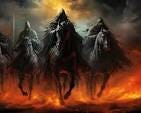The Four Horsemen and Modern Parallels with Global Leaders
“To delight in war is a merit in the soldier, a dangerous quality in the captain, and a positive crime in the statesman.”— George Santayana
Democratic initiatives are reversing course from the early 2000s when popular ideas about democracy and freedom were a global phenomenon. People were tired of authoritarian governance, high unemployment, and kleptocracies. Then, people all over the world seemed weary of egregious human rights abuses and the lack of accountability by Machiavellian rulers more interested in maintaining power than serving their people. Nowadays, the urgency to fight for democracy seems no longer present, as people all over the world are voting authoritarian leaders into office to suppress those same democratic initiatives.
We are living in an era of dystopia, where authoritarian figures have returned to dominate government, state enterprises, and high-tech militaries. The actions and rhetoric of leaders like Vladimir Putin, Benjamin Netanyahu, Xi Jinping, and Donald Trump evoke a chilling parallel to the biblical narrative of the Four Horsemen of the Apocalypse. These leaders, each wielding significant power, embody the themes of conquest, war, famine, and death that the Horsemen symbolize. Their politics often reflect a broader trend toward populism and nationalism, creating an environment full of tension and uncertainty.
The Four Horsemen serve as potent symbols of our recurring struggles against tyranny, conflict, and existential threats. When we take a closer look at contemporary autocrats, we can identify characteristics that mirror these archetypes. For example, the aggressive territorial ambitions of Putin and Netanyahu resonate with the rider of the pale horse, who represents conquest, while the divisive politics of Trump and the militaristic posturing of Jinping reflect the chaos and violence associated with the red horse. By drawing these connections, we can better understand how the rhetoric and policies of these leaders echo the timeless lessons of history and prophecy.
The idea of the Four Horsemen of the Apocalypse— representing Conquest, War, Famine, and Death— is a powerful metaphor for the challenges we face today. When analyzing the rhetoric and policies of these four leaders, one can reasonably conclude that these leaders embody the destructive forces on account of the active roles each man has taken in hastening war, famine, and disease.
War: The Horseman of Conflict
Vladimir Putin’s aggressive foreign policy, particularly his invasion of Ukraine in 2022, exemplifies the embodiment of war. This conflict has not only resulted in significant loss of life but continues to destabilize global security due to escalated tensions between NATO and Russia. Like most European wars in the past, this conflict has drawn in various nations, contributing to a broader climate of hostility reminiscent of World War II.
Similarly, Benjamin Netanyahu’s genocidal policies toward the Palestinians perpetuate a vicious cycle of violence and conflict in the Middle East. His administration’s military actions have resulted in nearly 45,000 civilian deaths. Netanyahu will purposely complicate and obstruct peace efforts, demonstrating the ongoing relevance of War as a Horseman in contemporary geopolitics.
Famine: The Horseman of Scarcity
Famine, the second Horseman, can be observed in the actions and consequences of Netanyahu’s war in Gaza. Putin’s war in Ukraine has disrupted food supply chains, which has led to increases in food prices and shortages in vulnerable regions around the world. Countries that rely on Ukrainian grain, such as those in Africa and the Middle East, have faced dire food insecurity. This further reveals how the decisions of powerful autocrats can have catastrophic repercussions on global food stability.
Xi Jinping’s economic strategies, including the strict lockdowns during the COVID-19 pandemic, also contributed to food shortages in China. The disruption of agricultural production and distribution networks has raised concerns about famine in a country that is traditionally a major player in the global food supply.
Disease: The Horseman of Pestilence
The COVID-19 pandemic exposed unprecedented political vulnerability here in the United States. It significantly eroded public trust and undermined our democratic institutions by transforming a global health crisis into a divisive political battleground. The COVID-19 pandemic may serve as the modern manifestation of the Horseman of Disease. While Trump’s handling of the pandemic was characterized by misinformation and a lack of decisive action— Xi Jinping’s initial response in Wuhan was marked by suppression of information, which caused the global health crisis. Both leaders’ approaches contributed to the spread of the virus and the resultant loss of millions of lives worldwide.
The ongoing impact of climate change is something made worse by the negligence of powerful autocrats. The correlation between environmental degradation and public health crises will undoubtedly lead to the emergence of new diseases. We can reasonably assume that the consequences of authoritarian rule extend beyond national borders, impacting global stability and human rights.
The actions of these modern “Horsemen” not only threaten human progress but also cultivate environments where fear and division flourish. My hope in illuminating these parallels was to point out the urgent need for collective awareness and action in the face of rising authoritarianism. We must end our inexplicable slide into modern serfdom at the hands of autocrats and their billionaire allies, and recommit ourselves to new democratic initiatives where individuals can better create a world of their own making.



